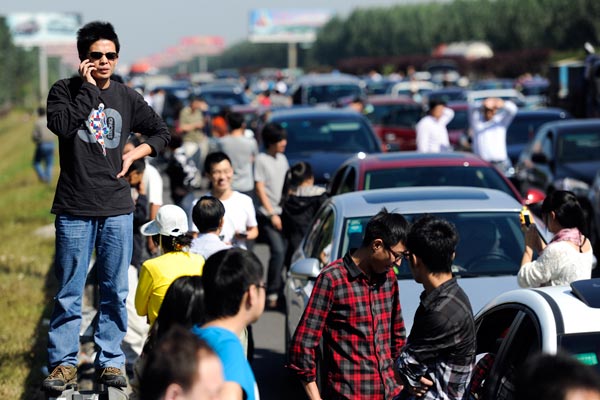Gridlock as tolls are waived for holiday
Updated: 2012-10-01 01:12
By TAN ZONGYANG (China Daily)
|
||||||||
Some drivers use the hard shoulder and emergency lanes to beat congestion
Huge traffic jams occurred on many of the country’s highways on Sunday, the first day of an eight-day holiday that exempts drivers of most cars from paying tolls nationwide for the first time.
|
 A traffic jam on the Beijing-Shanghai Expressway on Sunday. Heavy congestion was witnessed on Sunday because of a national toll-free policy running during the holiday.[Photo/china news agency] |
The policy, aimed at alleviating holiday road congestion by giving free passage to automobiles with seven seats or less, brought more vehicles to the roads than ever before, creating severe congestion.
Sunday officially marked the Mid-Autumn Festival, a traditional Chinese celebration when families get together.
On Sina Weibo, China’s Twitter-like micro-blogging service, a large number of photographs were posted online by private car owners who were driving out of hub cities such as Beijing, Shanghai and Guangzhou. They showed some roads were seriously blocked, looking more like parking lots as the sheer number of vehicles created gridlock.
Song Suwei, a reporter from Songjiang TV, a local TV channel in Shanghai, posted on the Sina Weibo website that a traveler trapped on the Shanghai-Kunming Highway for more than two hours even walked his dog to kill time.
Portable toilets were set up at several sections of the highways leading out of Shanghai in order to provide relief for long-suffering drivers and their passengers.
The Beijing Traffic Management Bureau reported long lines of cars from 6 am on Sunday in front of tollgates for all 17 expressways in Beijing, as many outbound passengers hit the road before dawn.
Figures show that at the Dujiakan Tollgate on the Beijing-Shijiazhuang Highway, 17,000 vehicles had passed through by 6 am, four times the number last year.
Meanwhile, the bureau also recorded several road accidents on Sunday morning, which aggravated the heavy traffic on the capital’s highway network.
In South China’s Guangdong province, two helicopters were put on duty to monitor the situation and assist the police in traffic duty.
The local traffic police were also equipped with more than 500 bicycles with warning lamps and loud-speakers for the first time in order to help regulate the traffic when highways became blocked.
"I heard there were long lines of cars waiting before midnight so I delayed my departure time for two days to avoid being caught up in the congestion," said Hao Dan, a 51-year-old woman who is going to drive from Guangzhou to the province’s Meizhou for a home visit.
Some drivers expressed regret at taking to their cars because their journeys took much longer than they thought they would.
Xu Shouli, a 28-year-old private car owner who set off from Beijing to Lianyungang in East China’s Jiangsu province, planned to have a family reunion dinner on the evening of the Mid-Autumn Festival. He thought he’d be lucky to get home before midnight.
"I chose to hit the road as early as 7 o’clock on Sunday morning but the traffic was already bad. There are too many cars on the roads," he told China Daily in a phone interview.
By 2:30 pm he had traveled just a quarter of the 750-kilometer journey on the Beijing-Shanghai Highway. On a normal day he would have arrived at his destination by then.
"The road should not be called a highway because I only moved five kilometers in one hour in the most congested section," he said, adding that the average speed on the road should be 100 kilometers an hour.
"I saw cars being driven on the hard shoulders or the emergency lanes of the roads, leaving no room for police if a traffic accident occurred."
He said the tollgates created a bottleneck even though there was no fee after he spent hours passing through one on the border of Beijing municipality and Hebei province.
The holiday toll-free policy, which was approved by the central government, has been hailed recently by many individual car owners for cutting their travel expenses, but also raised concerns. Some said it would increase traffic to an unusual level and even endanger road safety.
The Ministry of Transport earlier said congestion was expected to be heaviest on the first and last days of the holiday, when an estimated 86 million travelers would be on the roads.
Shi Jing in Shanghai and Xu Jingxi in Guangzhou contributed to the story.
tanzongyang@chinadaily.com.cn

 Relief reaches isolated village
Relief reaches isolated village
 Rainfall poses new threats to quake-hit region
Rainfall poses new threats to quake-hit region
 Funerals begin for Boston bombing victims
Funerals begin for Boston bombing victims
 Quake takeaway from China's Air Force
Quake takeaway from China's Air Force
 Obama celebrates young inventors at science fair
Obama celebrates young inventors at science fair
 Earth Day marked around the world
Earth Day marked around the world
 Volunteer team helping students find sense of normalcy
Volunteer team helping students find sense of normalcy
 Ethnic groups quick to join rescue efforts
Ethnic groups quick to join rescue efforts
Most Viewed
Editor's Picks

|

|

|

|

|

|
Today's Top News
Health new priority for quake zone
Xi meets US top military officer
Japan's boats driven out of Diaoyu
China mulls online shopping legislation
Bird flu death toll rises to 22
Putin appoints new ambassador to China
Japanese ships blocked from Diaoyu Islands
Inspired by Guan, more Chinese pick up golf
US Weekly

|

|






